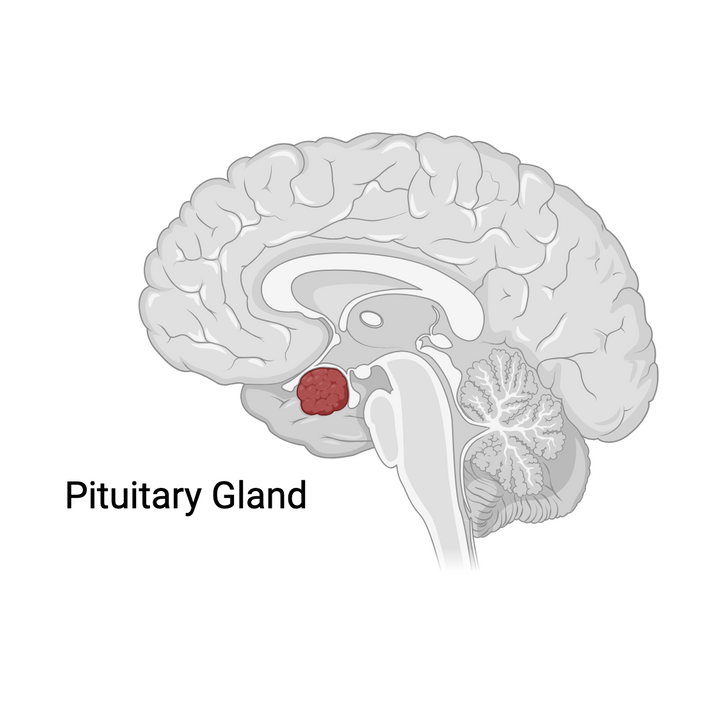Author: Tierney Baum, PhD, CSNK2A1 Foundation Strategic R&D Consultant
Edited by: Gabrielle Rushing, PhD, CSNK2A1 Foundation Chief Scientific Officer
Some OCNDS patients are smaller at birth and about ~1/3 of OCNDS kids have short stature or decreased weight gain. Understandably, families often ask about the use of growth hormones in the treatment of OCNDS.
Here is more information about what is currently known about growth hormone and OCNDS:
What is human growth hormone (HGH)?
Research on growth hormone and OCNDS
Current understanding of the effects of growth hormone on patients with OCNDS is limited, however there is a growing amount of research that shows there may be benefits to OCNDS patients with growth deficits. There have been 3 published case reports of OCNDS individuals with a growth hormone deficiency (Chiu et al., 2018; Wu et al., 2021). There are likely more undocumented cases due to challenges with blood draws and children with neurodevelopmental disorders.
One parent spoke with Dr. Rushing earlier this year and provided the following testimony about her child and journey with pursuing growth hormone treatment:
“Measurements of IGF-1 continue to be lower with each time they are tested, and at a level that is highly likely of partial growth hormone deficiency. Despite his short height and genetic diagnosis, to fully diagnose this will require a long stimulation test which will be quite difficult to achieve, given his intense medical anxiety and fight or flight response.
So, we are working on trying to find the right accommodations to get him through this testing. This testing requires getting an IV placed, and 5 hours of administering various medications and drawing blood at 30-minute intervals throughout, and the medications can cause nausea or low blood pressure. We have never been successful getting an IV placed before without him being sedated.”
This testimony is just one example highlighting the challenges families face in trying to determine appropriate treatment options for their children.
Growth hormone use in other rare neurodevelopmental syndromes
Supplementation with growth hormone has shown promising but modest effects in children with other neurodevelopmental disorders similar to OCNDS, such as Rett syndrome and Phelan-McDermid Syndrome (PMS).
A pilot study of less than ten children published in 2022 by researchers at the Icahn School of Medicine at Mount Sinai showed that treating PMS patients with human growth hormone was well-tolerated without causing serious side effects. This study showed some possible improvement in social withdrawal, hyperactivity, and sensory symptoms in these patients (Sethuram et al., 2022).
Though encouraging, more studies are needed to understand how growth hormone affects kids with neurodevelopmental disorders. Currently, we do not know how these results may translate to patients with OCNDS.
Current recommendations
In a 2022 interview with CSNK2A1 Foundation founder Jennifer Sills, Dr. Wendy Chung addressed the use of growth hormone in children with OCNDS.
Watch the interview here!
Dr. Chung explains that there is likely a modest effect on treating OCNDS patients with growth hormone since not all patients exhibit a deficit in growth hormone. Supplementing with growth hormone may be beneficial to accelerate growth earlier during childhood. So called ‘frontloading’ childhood growth may allow kids to socially benefit by growing at a similar rate to their peers. It is currently unclear whether there could be a long-term effect on overall height by doing this.
Dr. Chung also notes that because growth hormone improves lean muscle mass there may be some improvement in hypotonia in patients. She emphasizes that it is important to keep in mind some possible downsides to using growth hormone, including the following:
- Possible growth side effects (particularly if there is a strong family predisposition to tumors)
- Injectable medications can be difficult to administer to kids with OCNDS
- Costly medication (unlikely to be covered currently by insurance without evidence of growth hormone deficiency in a patient)
- Modest or possibly no improvement
If parents do decide to try growth hormone supplementation it would be beneficial to communicate the quantitative results to the broader OCNDS community. This can be done by requesting growth charts from your pediatrician or endocrinologist. By doing this we may be able to pool enough quantitative results to have a better picture of how supplementing with growth hormone specifically impacts kids with OCNDS.
Another way to provide your data for research is by participating in Citizen Health. Through Citizen Health, you can store and access all of your medical records in one place, share them with whomever you choose, and contribute to OCNDS research for free. Generating data for our natural history studies on Citizen Health doesn’t require any clinical visits. The data will be extracted from your existing medical records, de-identified for your privacy and protection and, with your consent, organized to share with researchers and pharmaceutical companies. Our goal is to enroll 100 families by the end of 2025! Learn more here:
Citizen Health.
References
Chiu ATG, Pei SLC, Mak CCY, Leung GKC, Yu MHC, Lee SL, Vreeburg M, Pfundt R, van der Burgt I, Kleefstra T, Frederic TM-T, Nambot S, Faivre L, Bruael A-L, Rossi M, Isidor B, Kury S, Cogne B, Besnard T, Willems M, Reijnders MRF, Chung BHY. Okur-Chung neurodevelopmental syndrome: Eight additional cases with implications on phenotype and genotype expansion. Clin Genet. 2018;93:880–90. [PubMed]
Sethuram S, Levy T, Foss-Feig J, Halpern D, Sandin S, Siper PM, Walker H, Buxbaum JD, Rapaport R, Kolevzon A. A proof-of-concept study of growth hormone in children with Phelan-McDermid syndrome. Mol Autism. 2022 Jan 29;13(1):6. doi: 10.1186/s13229-022-00485-7. PMID: 35093163; PMCID: PMC8800321.
Wu RH, Tang WT, Qiu KY, Li XJ, Tang DX, Meng Z, He ZW. Identification of novel CSNK2A1 variants and the genotype-phenotype relationships in patients with Okur-Chung neurodevelopmental syndrome: a case report and systematic literature review. J Int Med Res. 2021;49:3000605211017063. [PMC free article] [PubMed]

